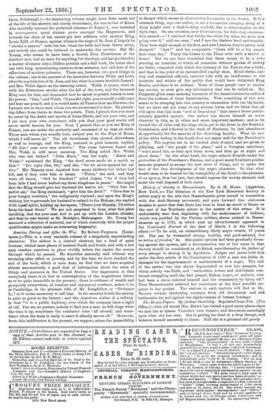History of Slavery in Massachusetts. By G. H. Moore. (Appleton,
New York.)— The librarian of tho New York Historical •Society is- rather angry at the airs that Massachusetts gives herself in connection with the Anti-Slavery movement, and puts forward this elaborate treatise to prove that that State has been at least .as ,much to blame as the rest of her Northern sisters in the matter of this crime. It is undoubtedly' true that, .beginning with the enslavement cif Indians, which was justified by the Puritan settlers, slaves existed in Massa- chusetts up to 1781, in which year an advertisement appeared in the Continental Journal of the date of March 1 to the following effect:—"To be sold, an extraordinary likely negro wench, 17 years old. She can be warranted strong, healthy, and good-natured, has
no notion of freedom," Arc. But public opinion had been gradually form- ing against the system, and a determination was at last come to that
slavery should be considered as abolished, notwithstanding the failure, of every :attempt to destroy it by legislation. Judges and juries held that under the first article of the Constitution of 1780 a man was liable in damages for the imprisonment or maltreatment of a negro. Tho end. of the matter was that slaves 'degenerated or rose into paupers, for whom nobody was liable, and "authorities, towns, and individuals con- tinued struggling until the last pauper, Indian, negro, or mulatto, who. had been a slave, relieved himself and the community by dying off."
Thus Massachusetts relieved her conscience at the least possible ex- pense to her pocket. Tho curious in such matters will find in Mr. Moore's volume interesting excerpts from old documents and odd testimonies for and against the righteousness of human bondage.






























 Previous page
Previous page